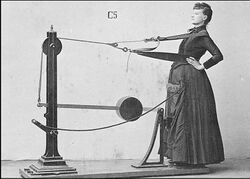Uncyclopedia:Vanity Policies
| This page is considered a policy on Uncyclopedia. It has wide acceptance among editors and is considered a standard that everyone should follow, unless they don't want to, in which case they are free to ignore it so long as they're not being a dick. Please make use of the standing on one knee position to propose to this policy. |
“Uncyclopedia is a spoof encyclopedia, and just as soon as you and your web forum make it into a real encyclopedia we'll welcome you with open arms. Until then, there's always MySpace.”
Vanity pages are articles about a particular individual, group, or organization generally written by an individual associated with the article's subject. If you would like to make a vanity page, there are several places for you to do so:
As at Wikipedia, vanity pages are deleted on sight here at Uncyclopedia, regardless of other tags placed on them. This is an encyclopedia,[citation needed] not personal webspace.
The "Codeine's Mum" test for vanity
Generally, when deciding if a page is vanity, we run the Codeine's[1] Mum test:
- Might Codeine's Mum have heard of this group/individual/organization?
- If the answer is No, the page gets deleted. Immediately.[2]
- If the answer is Yes, then we evaluate it as we would any other normal article.
But what if Codeine's Mum is not available to ask?
- In that case, we attempt to discern whether or not she might have heard of it by checking:
If the article fails more than two (2) of the above checks, it is deleted as vanity. (If both fails are that it is unfunny, it is deleted and the Vanity Policies don't have to be mentioned.)
Examples
Pages on a YouTube personality, an aspiring garage band, an up-and-coming weblogger, or the overnight talk radio host in St. Clairsville, Ohio are immediately suspect. These people are trying to establish a following — which one does by getting the word out — which is advertising. Such new articles need to serve the general Uncyclopedia reader and not the subject of the article. They can do so by being very funny (just as you can break most of Uncyclopedia's rules by being very funny). However, material that gives opinions about or trolls the personality, or provides humor that is mainly funny to the personality's fan club, does not serve the general reader.
We famously avoid the chance to turn a quick buck by selling exposure to our readers to paying advertisers. So we wouldn't boost these people even if they paid us, and we won't let a new article boost them given that no one is paying us.
If the personality gets established (sufficiently that Codeine's Mum might have heard of him/her/non-specific), an article deleted for vanity might then be appropriate, and any Admin can go to the mag-tapes and recover the deleted text on request of any Uncyclopedian who wants to take it further.
User pages
Your user page should act as a means of introducing yourself to other Uncyclopedians. User pages don't need to conform to the template rules or funniness standards. However, cyberbullying, slander, and personal attacks are not permitted anywhere on Uncyclopedia, even in your userspace. Furthermore, your userpage may not be used for personal use. Listing information about yourself or using your user page to store content for an offsite activity is not acceptable. Admins may delete a user page that does not meet these standards.
You can get to your user page by clicking on your username at the very top of the page. You must be a registered user to edit your user page.
Do not create redirects to your user page from an article in the main encyclopedia. Redirects may temporarily exist if a user's page has been moved to their User: space (by them or by an administrator), but list these on QVFD if you spot one.
Notes
- ↑ Codeine
iswas an Uncyclopedia Admin. The test of whether his mother might have heard of the subject of a new Uncyclopedia article can be applied independently of whether anyone left on Uncyclopedia has ever heard of Codeine. - ↑ This is an "administrative deletion," no listing, no voting, no archive pages, no evidence; except that if you try to bring up the page, you may see an explanation why it was deleted.


